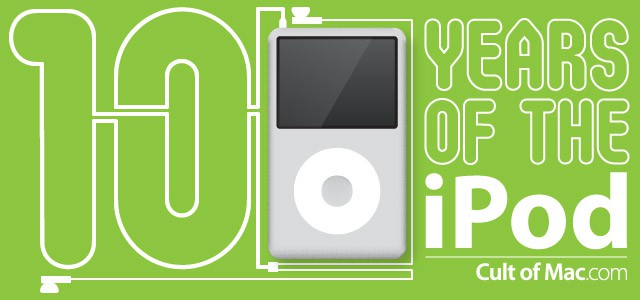The iPod is essentially Apple’s typewriter: a piece of technology that reshaped society completely, then was made redundant by its descendants. However, the iPod’s birth a decade ago launched a legacy that can’t be ignored, no matter how hard you try.
Along with transforming how we get our music, launching iTunes and the App Store, the iPod created an entire accessories industry worth more than $1 billion per year at its height. Belkin, a seller of rather non-descript computer add-ons, exploded with the iPod’s arrival. By 2006, selling iPod accessories comprised a “significant” amount of Belkin’s profits, according to CNN.
From clocks to speakers and boom-boxes, the market for iPod accessories remained vibrant amid a growing family of products. With iPod sales regularly outpacing Wall Street expectations, gadgets aimed at the iPod mushroomed. By 2006, 20-30 percent of vendors at the 2006 Macworld Expo were selling iPod accessories. Two years later, the iPod add-on industry was growing by 45 percent annually, the Consumer Electronics Association said.
The transformation of the iPod as a separate device to part of everyday life was already underway. The first category of iPod accessories to shrink was speakers, a very hot segment. In 2007, speakers meant specifically for the iPod were outselling living room stereo systems or home theaters. Production of iPod speakers rose 45 percent in 2007 and another 23 percent in 2008, reaching $1.07 billion in sales. By comparison, sales of compact stereo systems and home theaters fell to $1.04 billion the same year, according to the CEA.
Companies such Belkin, boom box maker Lifepod and speaker system vendor iLevel saw the iPod enter the family car and redefining road trips.
The iPod’s portability naturally caused consumers to take the device on the road. The lack of a way to listen to your tunes on a superior auto speaker system gave birth to another iPod accessory: the FM transmitter which wirelessly streamed your music to the car’s FM radio. However, soon supporting Apple’s device became as common as powered windows.
Speaking at the 2006 Macworld Expo, Apple CEO Steve Jobs announced 40 percent of autos sold in the U.S. would have integrated iPod support. Luxury automaker Mercedes Benz introduced a kit allowing drivers to listen to their iPod’s music list through the car’s audio system – and select tunes via the steering wheel. Chrysler soon jumped aboard the iPod auto bandwagon. Today, it is difficult finding a car that cannot support your iPod.
Belkin, like other members of the iPod economy, also mainstreamed the Apple device. The company introduced a way to view videos from your iPod through the car’s seatback screens, along with other auto-related accessories.
Probably the most resilient segment of the iPod economy is the multi-million dollar case industry born to protect your important mobile devices. Hard Candy, a case company expecting to make $50 million a year, got its start building iPod cases designed by guessing Apple’s next move. In September 2010, the company quickly had cases on store shelves for Apple’s just-announced iPod touch thanks to designs leaked months previously by international manufacturing partners, according to Bloomberg BusinessWeek.
The case business is likely the most lucrative portion of the iPod economy and the most enduring. Today, consumers spend more than $436 million on cases for their iPhone and other mobile phones, according to retail research firm NPD Group.
The iPod economy, begun a decade ago, lives on. The iPhone, launched in 2007, has become one of the most successful consumer devices ever conceived. However, at its roots is the iPod, a device that still is making an impression today.


